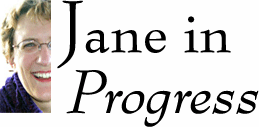 |
|
 |
 |
Looking for tips and tricks to the art of writing for television? Welcome to the blog of experienced television writer Jane Espenson. Check it out regularly to learn about spec scripts, writing dos and don'ts, and what Jane had for lunch! (RSS:  ) |
|
|
Home » Archives » December 2007 » The Laugh on the Cut
[Previous entry: "Nothing to Sneeze At"] [Next entry: "Make Sure They're Not Fake"]
12/15/2007: The Laugh on the Cut
Last night was the "Write Aid" comedy event at UCLA. So funny! Patton Oswalt had the place gasping for air, he was so good. He even had screenwriting-themed material suited for the crowd. Brilliant.
Everyone was very sharp, and Eddie Izzard was great, as usual. Eddie has a certain trick that's also used by Steve Martin and which is described nicely in Steve's new book (get the audio version, it's unabridged and you get to hear him deliver the material). I'm referring to the sudden change of subject which gets a laugh in itself as the audience realizes that the previous joke or joke run is over. Listen to a classic Steve Martin routine or to some Eddie Izzard and you'll hear it. It's like a bonus laugh on the transition between two topics. Interestingly, this is analogous to something that can be done in a script by ending a scene a few beats before the audience expects the cut. And it's just as effective in a script as it is on the stand-up stage.
Sometimes the effect isn't humorous, as when a character asks another character a question, and instead of the expected answer we cut to a new shot that answers the question. (i.e. "But where do you suppose he dropped the gun?" CUT TO: a gun almost buried in a golf course sand trap.) That might not be funny, but instead dramatic. But often the effect is humorous. In what appears to be the middle of a scene, for example, an affronted Character One might turn to Character Two and say, "Wait-- did you just call me fat?" Character Two blanches and opens their mouth, clearly formulating a long stammering excuse. But before they produce it, we cut away to another scene, and the joke is an implicit, "We all know how this is gonna go, so let's just take it as written." The Office does this sort of thing a lot. It's like giving your script a point of view on the events that doesn't belong to any of the characters, but rather to you, to the storyteller.
If you've got a script that has a tone breezy enough that it can take a bit of cheeky imposition of this type, you might want to give it a try. Eddie Izzard and Steve Martin get a lot of mileage out of cutting out of a bit early; see how it works for you.
Lunch: In 'N' Out burger, animal style. Fries. Dr. Pepper
|
|
|
 |
|
Get Blog Updates Via Email
|
|
 |

